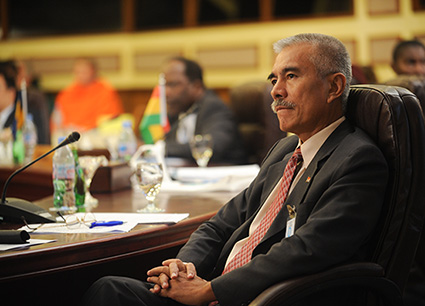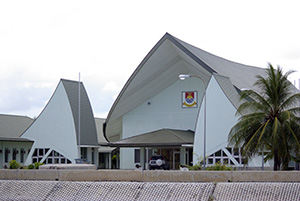
The Kiribati government has pushed a new bill to reinstate capital punishment – a move said to be in response to public outrage over several violent murders this year. However, as Asia-Pacific Journalism's Elesha Edmonds reports, the government faces growing public opposition to the proposal.
The proposed reinstatement of the death penalty in Kiribati is triggering public criticism.
The Parliament of Kiribati late last month passed the first reading of an amendment to the penal code to permit the use of capital punishment in certain criminal cases.
This comes after the violent deaths of five Kiribati women this year, allegedly at the hands of their partners or husbands.
Taberannang Korauaba, editor of the Kiribati Independent, says the deaths sparked public outrage which motivated the government to push forward the proposed bill.
“The killings were seen as copycats and sparked criticism and public outcry,” he says.
Kiribati President Anote Tong could not be reached for comment as he was currently visiting the Arctic. However, following the bill’s first reading he said it would work as a deterrent for deliberate killings.
“Now you have different levels of murder and what people are saying is, you know there should be different degrees of punishment also given the severity and the gruesomeness or the brutality of the act,” he told Radio Australia.
Referendum considered
According to the Kiribati parliamentary process, the bill cannot become law until it passes its second reading in Parliament in December and is then signed off by the President.
Kiribati’s Parliament House … controversial bill follows the deaths of five Kiribati women allegedly by their husbands or partners this year. 
In the meantime the government is forming a review committee and is considering holding a referendum to gauge the public’s reaction to the proposal.
“There are mixed reactions to this bill, but based on what I read in our news is that many people oppose it,” says Korauaba.
“I don’t think it will work in a small country like Kiribati where people live close to each other. You even know what the other one is doing or eating. Imagine then, when the bill becomes law, how would the accused be executed, where, when, and who’s going to do the execution?”
The two main Kiribati churches have publically opposed the bill, with both leaders of the Catholic Church and Kiribati Uniting Church saying capital punishment denies the right to life.
The chairman of the Kiribati council of churches, Bishop Paul Mea Kaiuea, says there is no evidence to suggest the death penalty will prevent murder.
“In Kiribati we already have life imprisonment for those who kill and we think this is more than sufficient for death penalty. The death penalty is a kind of a short cut to get rid of those who committed murder based on hatred and revenge.
Compassion cited
“As Christian churches we need to have compassion on those who commit murder, like Christ himself.”
Opposition leader Dr Tetaua Taitai says he does not think the death penalty addresses the reasons that motivate murder, such as the effects of alcohol or land disputes.
“As a deterrent for deliberate killings, as the President says, I do not agree with that as most of the killings from the perspectives of those committing them, they have their own reasons for committing them,” he says.
“Killing the accused will not deter future incidents unless some of the root causes mentioned are tackled.”
Kate Schuetze, Pacific researcher for Amnesty International, is surprised there has not been more public debate on the bill.
“I think they tend to underestimate the seriousness of such an issue when it comes up and dismiss it as something that will never happen. The Pacific culture is such that leaders are not directly challenged or questioned, which also makes opposition difficult.”
Schuetze says she is worried Kiribati will repeat the actions of the Papua New Guinea government, which last year rushed through expanded death penalty laws in response to the gang rape and violent killings of women accused of sorcery.
Not taken seriously
“There was talk of this in advance, but no one took it seriously and a bill was only circulated days before it was passed,” she says.
“In the Pacific it is not uncommon for laws to pass quickly without much public or parliamentary debate on the issue. I am worried that some governments do this deliberately to stop people voicing their opposition.”
Tagaloatele Professor Peggy Fairbairn-Dunlop, professor of Pacific Studies at AUT University, says she is surprised she has not seen more of a response internationally from women in regards to the bill.
“Usually it’s the women, in every Pacific society that I know, they’ve always been arguing against inhumane measures of life for life but this one is a total mystery for me,” says Tagaloatele.
“I would have expected that the women’s response would have been similar to that of the church, that it is not a Christian way and it is not a culturally strong way to address an issue although it is a great wrong to take a life.”
Second reading
Shamima Ali, coordinator of the Pacific Women’s Network against Violence against Women, says the network is currently writing to the President to voice its concerns.
“State-sanctioned violence further desensitises people and contributes to the acceptance of vengeance and retribution as legitimate sanctions,” she says.
“Governments must work with civil society to empower women in all areas of life and explore non-violent punishment which can actually deter crime, as well as work with men to address root causes of violence.”
With opposition toward the bill growing, Dr Tetaua Taitai says the government will have to take this into account when it comes to the second sitting of Parliament in December.
“I have a feeling that the President and the government party will change their mind when it comes to its second reading in December this year as the passage of its first reading was seen as a political ploy to show support for his constituency,” he says.
“Now he knows that people are not supportive and therefore he will try to come up with a good reason for not supporting its second reading in the next Parliament in December.”
This work is licensed under a Creative Commons Attribution-NonCommercial 3.0 New Zealand Licence.



